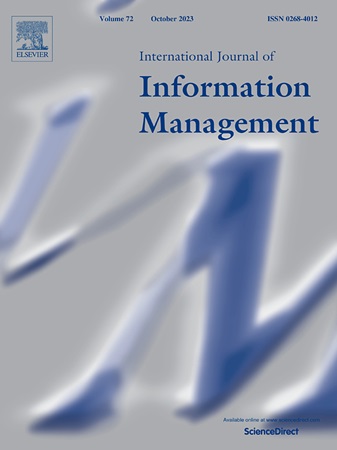Helping others is helping oneself: A mixed-methods investigation of antecedents driving consumer engagement in the value co-creation of mHealth platforms
IF 27
1区 管理学
Q1 INFORMATION SCIENCE & LIBRARY SCIENCE
International Journal of Information Management
Pub Date : 2024-12-10
DOI:10.1016/j.ijinfomgt.2024.102867
引用次数: 0
Abstract
Consumer engagement in co-creation is crucial for maintaining a successful and sustainable mobile health (mHealth) ecosystem, as multiple stages of mHealth services require consumer engagement, collaboration, and evaluation. Unlike online health communities and offline medical institutions, mHealth encompasses a technology focus and human-technology interaction. Compared to healthcare providers primarily driven by economic interests, there is a lack of empirical evidence concerning what drives consumer engagement in the co-creation of mHealth. Thus, we adopted a mixed-method design consisting of two qualitative and two quantitative studies. Specifically, we identified four key dimensions through an exploratory qualitative study: quality, interactive factors, technical cognition, and trust. Then, we further analyzed the interrelationship between constructs and proposed our proposed framework based on the DeLone and McLean IS success (D&M) model. Two quantitative studies validated the applicability of the proposed framework in large sample sizes and cross-country contexts (China and the US). In addition, considering the possible asymmetric relationship between the antecedents and consumer engagement, we utilized the fsQCA method to reveal its configuration patterns. Our results further enrich the stream of mHealth research in the information system (IS) fields and value co-creation in technology-enabled healthcare services. Moreover, our focus on technology factors provides opportunities for system design and improvement of mHealth.
帮助他人就是帮助自己:一项对推动消费者参与移动医疗平台价值共同创造的前因的混合方法调查
消费者参与共同创造对于维持成功和可持续的移动医疗(mHealth)生态系统至关重要,因为移动医疗服务的多个阶段都需要消费者参与、协作和评估。与在线健康社区和线下医疗机构不同,移动健康包含了技术重点和人机交互。与主要受经济利益驱动的医疗保健提供者相比,缺乏关于驱动消费者参与共同创造移动医疗的经验证据。因此,我们采用了由两个定性和两个定量研究组成的混合方法设计。具体而言,我们通过探索性质的研究确定了四个关键维度:质量、互动因素、技术认知和信任。然后,我们进一步分析了构式之间的相互关系,并基于DeLone和McLean IS success (D&;M)模型提出了我们提出的框架。两项定量研究证实了所提议的框架在大样本和跨国背景下(中国和美国)的适用性。此外,考虑到先行词与消费者参与之间可能存在的不对称关系,我们利用fsQCA方法揭示了其配置模式。我们的研究成果进一步丰富了信息系统(IS)领域的移动医疗研究流,并在技术驱动的医疗服务中共同创造价值。此外,我们对技术因素的关注为移动健康的系统设计和改进提供了机会。
本文章由计算机程序翻译,如有差异,请以英文原文为准。
求助全文
约1分钟内获得全文
求助全文
来源期刊

International Journal of Information Management
INFORMATION SCIENCE & LIBRARY SCIENCE-
CiteScore
53.10
自引率
6.20%
发文量
111
审稿时长
24 days
期刊介绍:
The International Journal of Information Management (IJIM) is a distinguished, international, and peer-reviewed journal dedicated to providing its readers with top-notch analysis and discussions within the evolving field of information management. Key features of the journal include:
Comprehensive Coverage:
IJIM keeps readers informed with major papers, reports, and reviews.
Topical Relevance:
The journal remains current and relevant through Viewpoint articles and regular features like Research Notes, Case Studies, and a Reviews section, ensuring readers are updated on contemporary issues.
Focus on Quality:
IJIM prioritizes high-quality papers that address contemporary issues in information management.
 求助内容:
求助内容: 应助结果提醒方式:
应助结果提醒方式:


